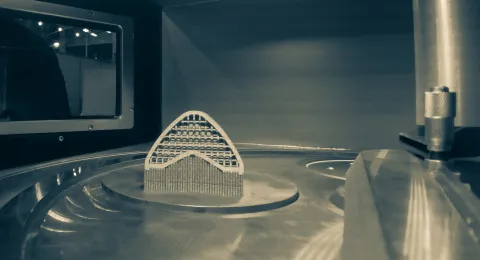The manufacturing industry of the future could involve a distributed storage network and replacing large production units with smaller local units. Products could be manufactured near the consumer, which saves time and money and spares the environment. Industrial enterprises would purchase raw materials and components to locations where they are needed.
Another key idea would be to manufacture products according to demand instead of maintaining a large inventory.
3D and 4D technologies will become increasingly common, benefitting regular consumers and enabling them to collect a piece of furniture or car part from a pickup point near their home. New technologies provide industry with countless opportunities.
This is how Veli Matti Virolainen, supply management professor at the LUT School of Business and Management and director of the AMBI research platform, sees the future. LUT University’s AMBI platform develops new tools and models for the management of the manufacturing industry in a digitalized world.
AMBI is short for Analytics-Based Management for Business and Manufacturing Industry. It is one of LUT’s five research platforms and the only one headed by the LUT School of Business and Management.
”You could say that in many ways, we are creating something from scratch. At AMBI, we develop techno-economic simulation models for industries, such as mining, and intelligent supply chain management mechanisms that adapt quickly to changes in demand,” says Pasi Luukka, professor at the LUT School of Business and Management and second-in-command at AMBI.
Virolainen describes the platform as extensive and cross-disciplinary. Its output can help businesses improve their competitiveness and promote a sustainable digital economy, all the while providing LUT University with a strong experimental corporate research group.
“We can help pull Europe back to the top echelon of the global manufacturing industry,” Virolainen envisions.
What does AMBI study?
- The importance and robotics of 3D and 4D manufacturing technologies in the manufacturing industry
- The utilization of artificial intelligence and digital tools such as the Internet of Things (sensors, videos) and digitized and automated ecosystems
- New artificial intelligence and machine learning methods in business analytics
- Business models related to manufacturing and production and decision-making based on analytics
- Intelligent cost-benefit analysis methods for industry
- Intelligent supply chain risk management and resilience
- Corporate analytics with a soft computing angle
Improving the resilience of businesses
AMBI strongly highlights the viewpoint of business enterprises.
”The COVID-19 pandemic caused many problems for industry, but AMBI aims to develop models that increase companies’ resilience or fault tolerance – also in so-called normal situations,” Virolainen explains.
Pasi Luukka says that risk management systems based on data analytics enhance a company’s resilience. Luukka specializes in data and business analytics and fuzzy methods in data processing.
Luukka points out that big data provides vast and valuable help to a company’s supply management when supplier tender competitions, agreements and reporting largely take place in digital systems. AMBI aims to take the utilization of data analytics to a whole new level.
“We are developing new analytics methods that will enable the modeling of a company’s entire life cycle. We will be able to carry out profitability calculations with new real option models,” Luukka relates.
Real option models apply option valuation techniques to capital budget decisions.
Virolainen and Luukka add that utilizing data efficiently does not take away from the importance of human beings in company management.
”Artificial intelligence will automate many data-based decision-making processes, but humans will still be needed to design business models,” Luukka outlines.
Psychological factors behind financial decisions
The AMBI research platform also collaborates with one of LUT’s strategic research partners, the University of Trento, in the application of behavioral sciences.
The Viipuri Lab on LUT’s campus in Lappeenranta will set the stage for a simulated real-life stress situation that will help to determine what choices managers would make in an uncertain situation and on what grounds.
“AMBI promotes understanding of how cognition influences an individual’s behavior in financing, decision-making or business analytics,” Veli Matti Virolainen says.
An experimental approach helps to pinpoint misconceptions that prevent individuals from innovating and evolving.
The five-year AMBI research platform includes researchers from all of LUT’s schools.
The platform’s projects are funded by organizations such as the Strategic Research Council of the Academy of Finland. The platform is also preparing to apply for EU funding and other external funding.
More information:










